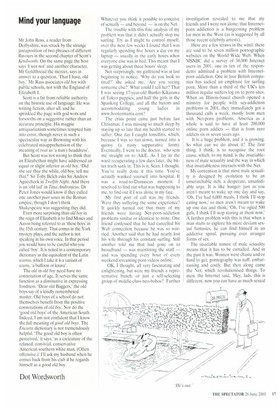Mind your language
Mr John Ross, a reader from Derbyshire, was struck by the strange juxtaposition of two phrases of different flavours in the second chapter of Scott's Kenilworth. On the same page the host says 'I wot not' and another character, Mr Goldthread the mercer, says in answer to a question, 'That I have, old boy.' Mr Russ associates old boy with public schools, not with the England of Elizabeth I.
Scott is a far from reliable authority on the historic use of language. He was writing fiction, after all, and he sprinkled the page with god wots and forsooths on a suggestive rather than an accurate principle. His magpie antiquarianism sometimes tempted him into error, though never in such a spectacular way as Browning with his celebrated misapprehension of the meaning of twat as 'a nun's headdress'.
But Scott was not wrong to think that an Elizabethan might have addressed an equal or slight inferior as old boy. 'Did she see thee the while, old boy, tell me that?' Sir Toby Belch asks Sir Andrew Ague cheek in Twelfth Night. And there is an 'old lad' in Titus Andronieus. Dr Peter Jones would know if they called one anotherpuer senex in the Roman empire, though I don't think Shakespeare was suggesting they did.
Even more surprising than old boy in the reign of Elizabeth is to find Moses and Aaron being referred to as 'these boys' in the 15th century. That comes in the York mystery plays, and the author is not speaking in his own voice. In that period you would have to be careful who you called 'boy'. It is noted in a contemporary dictionary as the equivalent of the Latin scurnis. which I take it is a variant of scutra, 'a buffoon or knave'.
The old in old boy need have no connotation of age. It serves the same function as a diminutive in expressing fondness. 'Dear old Baggers,' the old boys say of a kindly remembered master. Old boys of a school do not themselves benefit from the positive connotations of old boy. Nor do the 'good old boys' of the American South. Indeed, I am not confident that I know the full meaning of good old boys. The Encarta dictionary is not tremendously helpful. The good old boy is often perceived,' it says, 'as a caricature of the relaxed, convivial, conservative American southern white man. (Often offensive.)' I'll ask my husband when he comes back from his club if he regards himself as a good old boy.
Dot Wordsworth


































































 Previous page
Previous page